Psychology Essay: Exploring Parental Knowledge During Adolescence
VerifiedAdded on 2023/06/10
|6
|1658
|161
Essay
AI Summary
This psychology essay reviews an article focusing on parental knowledge of their children's activities during adolescence, particularly within a German school sample. The essay highlights the decline in parental involvement due to work pressures and explores factors influencing this trend, such as child temperament and family relationships. It discusses the role of school psychologists in assisting children and evaluating parent-child relationships. The analysis includes a longitudinal cluster analysis of three hypothetical studies, revealing developmental patterns of parental knowledge. Ethical concerns, such as fidelity, responsibility, and respect for people's rights, are addressed in relation to the study's methodology and potential impact on parents and children. The essay concludes by discussing the study's findings, including the decrease in parental knowledge during adolescence, and suggests interventions to address this issue. Desklib provides a platform for students to access similar essays and study resources.
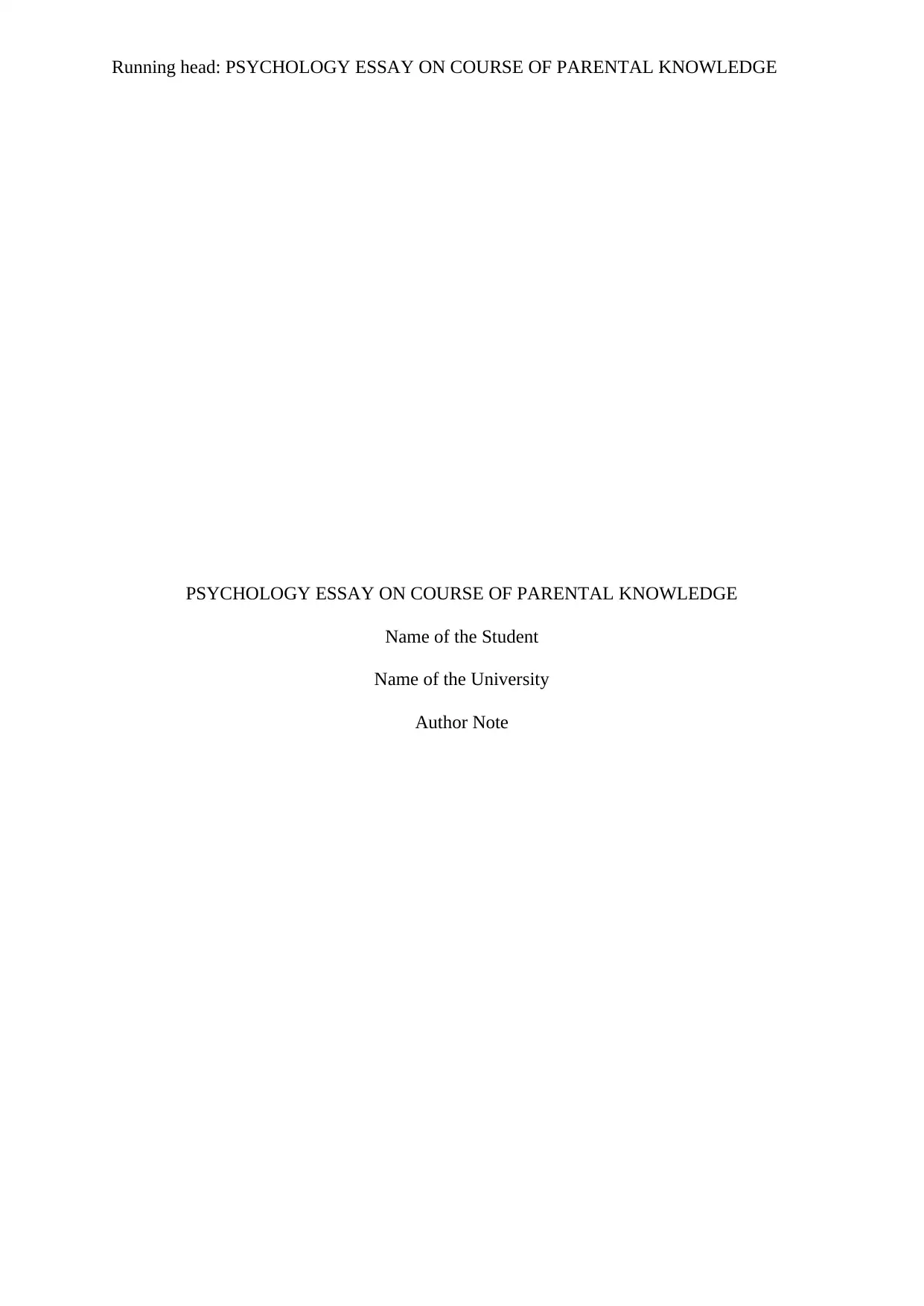
Running head: PSYCHOLOGY ESSAY ON COURSE OF PARENTAL KNOWLEDGE
PSYCHOLOGY ESSAY ON COURSE OF PARENTAL KNOWLEDGE
Name of the Student
Name of the University
Author Note
PSYCHOLOGY ESSAY ON COURSE OF PARENTAL KNOWLEDGE
Name of the Student
Name of the University
Author Note
Paraphrase This Document
Need a fresh take? Get an instant paraphrase of this document with our AI Paraphraser
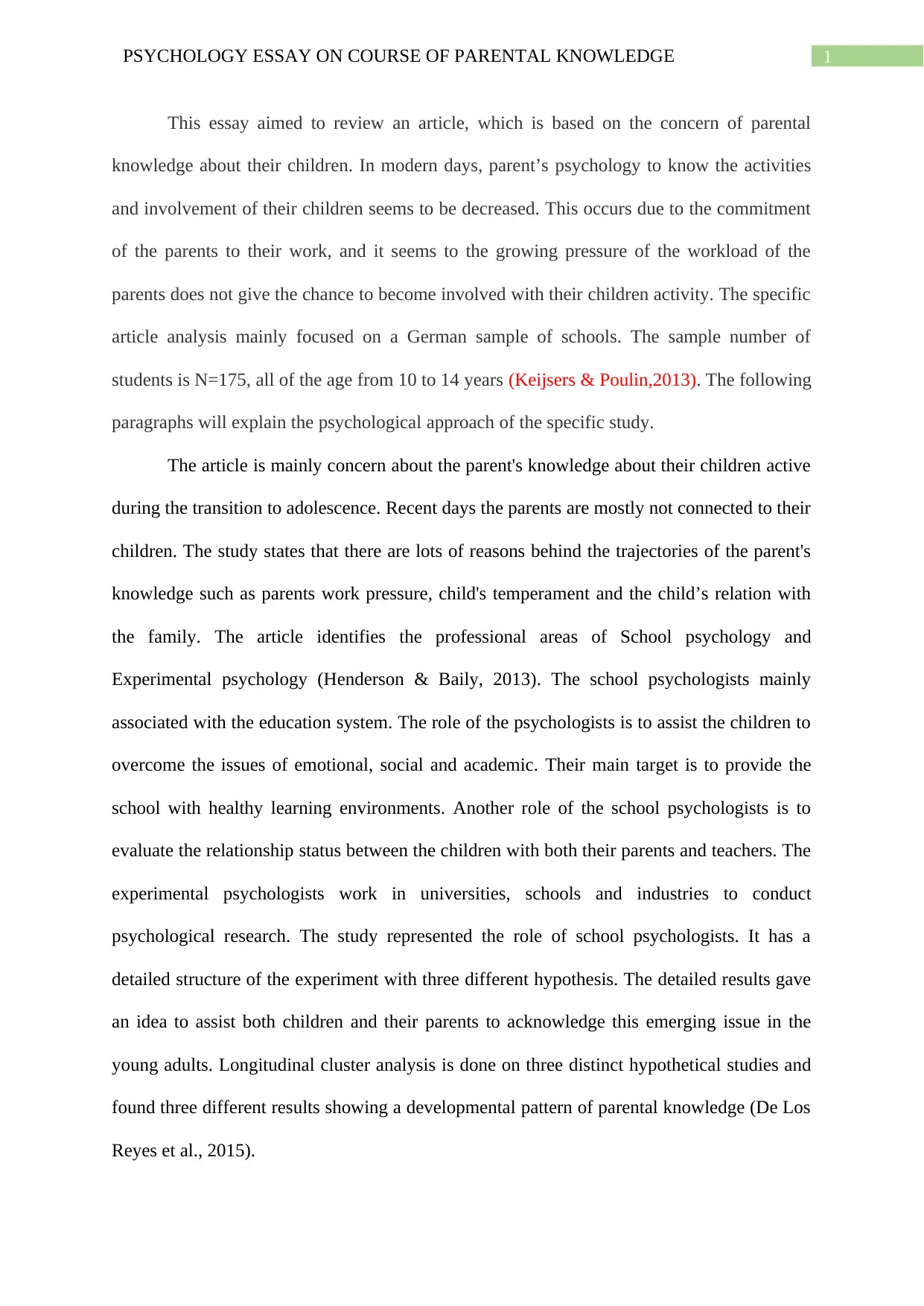
1PSYCHOLOGY ESSAY ON COURSE OF PARENTAL KNOWLEDGE
This essay aimed to review an article, which is based on the concern of parental
knowledge about their children. In modern days, parent’s psychology to know the activities
and involvement of their children seems to be decreased. This occurs due to the commitment
of the parents to their work, and it seems to the growing pressure of the workload of the
parents does not give the chance to become involved with their children activity. The specific
article analysis mainly focused on a German sample of schools. The sample number of
students is N=175, all of the age from 10 to 14 years (Keijsers & Poulin,2013). The following
paragraphs will explain the psychological approach of the specific study.
The article is mainly concern about the parent's knowledge about their children active
during the transition to adolescence. Recent days the parents are mostly not connected to their
children. The study states that there are lots of reasons behind the trajectories of the parent's
knowledge such as parents work pressure, child's temperament and the child’s relation with
the family. The article identifies the professional areas of School psychology and
Experimental psychology (Henderson & Baily, 2013). The school psychologists mainly
associated with the education system. The role of the psychologists is to assist the children to
overcome the issues of emotional, social and academic. Their main target is to provide the
school with healthy learning environments. Another role of the school psychologists is to
evaluate the relationship status between the children with both their parents and teachers. The
experimental psychologists work in universities, schools and industries to conduct
psychological research. The study represented the role of school psychologists. It has a
detailed structure of the experiment with three different hypothesis. The detailed results gave
an idea to assist both children and their parents to acknowledge this emerging issue in the
young adults. Longitudinal cluster analysis is done on three distinct hypothetical studies and
found three different results showing a developmental pattern of parental knowledge (De Los
Reyes et al., 2015).
This essay aimed to review an article, which is based on the concern of parental
knowledge about their children. In modern days, parent’s psychology to know the activities
and involvement of their children seems to be decreased. This occurs due to the commitment
of the parents to their work, and it seems to the growing pressure of the workload of the
parents does not give the chance to become involved with their children activity. The specific
article analysis mainly focused on a German sample of schools. The sample number of
students is N=175, all of the age from 10 to 14 years (Keijsers & Poulin,2013). The following
paragraphs will explain the psychological approach of the specific study.
The article is mainly concern about the parent's knowledge about their children active
during the transition to adolescence. Recent days the parents are mostly not connected to their
children. The study states that there are lots of reasons behind the trajectories of the parent's
knowledge such as parents work pressure, child's temperament and the child’s relation with
the family. The article identifies the professional areas of School psychology and
Experimental psychology (Henderson & Baily, 2013). The school psychologists mainly
associated with the education system. The role of the psychologists is to assist the children to
overcome the issues of emotional, social and academic. Their main target is to provide the
school with healthy learning environments. Another role of the school psychologists is to
evaluate the relationship status between the children with both their parents and teachers. The
experimental psychologists work in universities, schools and industries to conduct
psychological research. The study represented the role of school psychologists. It has a
detailed structure of the experiment with three different hypothesis. The detailed results gave
an idea to assist both children and their parents to acknowledge this emerging issue in the
young adults. Longitudinal cluster analysis is done on three distinct hypothetical studies and
found three different results showing a developmental pattern of parental knowledge (De Los
Reyes et al., 2015).
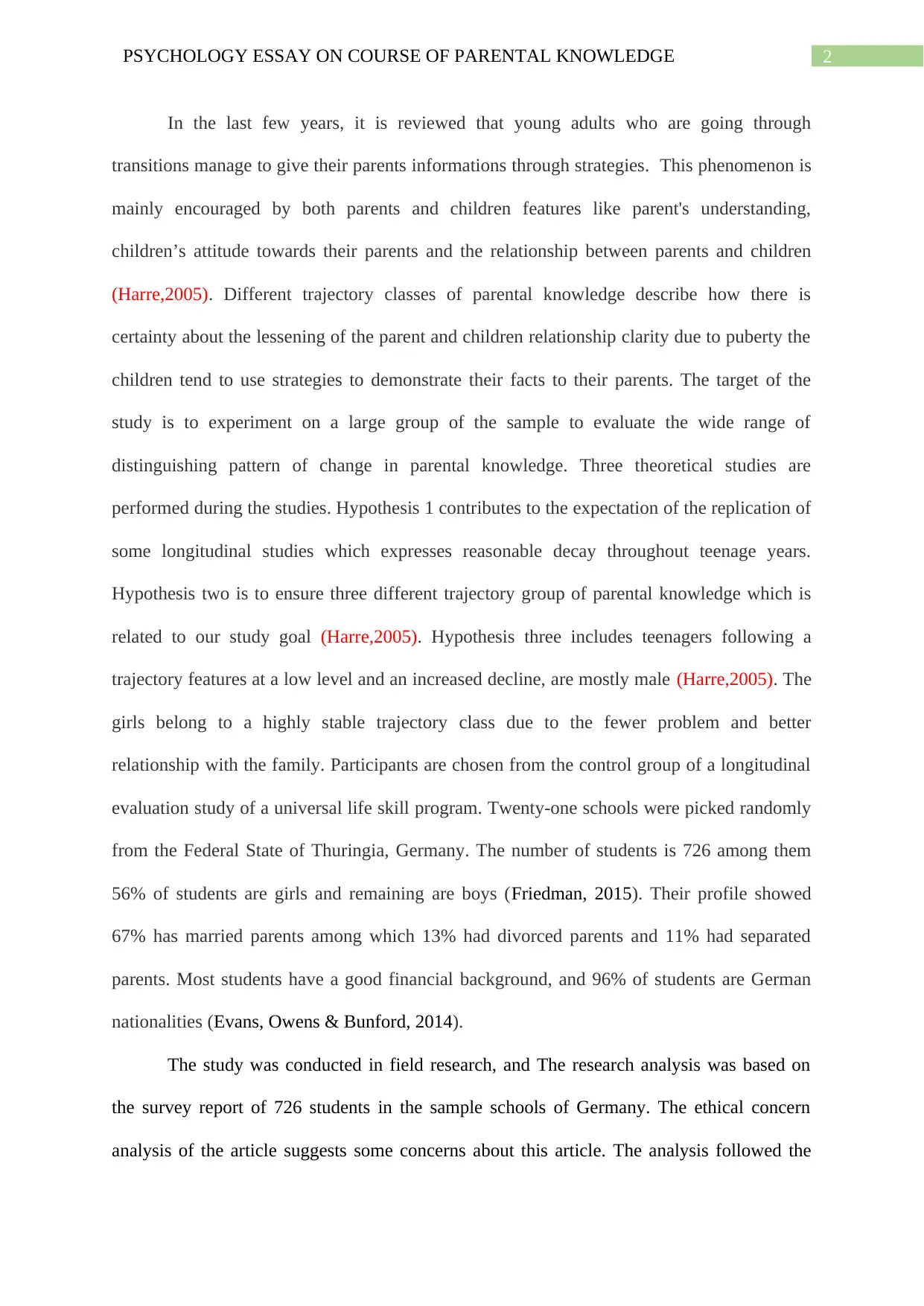
2PSYCHOLOGY ESSAY ON COURSE OF PARENTAL KNOWLEDGE
In the last few years, it is reviewed that young adults who are going through
transitions manage to give their parents informations through strategies. This phenomenon is
mainly encouraged by both parents and children features like parent's understanding,
children’s attitude towards their parents and the relationship between parents and children
(Harre,2005). Different trajectory classes of parental knowledge describe how there is
certainty about the lessening of the parent and children relationship clarity due to puberty the
children tend to use strategies to demonstrate their facts to their parents. The target of the
study is to experiment on a large group of the sample to evaluate the wide range of
distinguishing pattern of change in parental knowledge. Three theoretical studies are
performed during the studies. Hypothesis 1 contributes to the expectation of the replication of
some longitudinal studies which expresses reasonable decay throughout teenage years.
Hypothesis two is to ensure three different trajectory group of parental knowledge which is
related to our study goal (Harre,2005). Hypothesis three includes teenagers following a
trajectory features at a low level and an increased decline, are mostly male (Harre,2005). The
girls belong to a highly stable trajectory class due to the fewer problem and better
relationship with the family. Participants are chosen from the control group of a longitudinal
evaluation study of a universal life skill program. Twenty-one schools were picked randomly
from the Federal State of Thuringia, Germany. The number of students is 726 among them
56% of students are girls and remaining are boys (Friedman, 2015). Their profile showed
67% has married parents among which 13% had divorced parents and 11% had separated
parents. Most students have a good financial background, and 96% of students are German
nationalities (Evans, Owens & Bunford, 2014).
The study was conducted in field research, and The research analysis was based on
the survey report of 726 students in the sample schools of Germany. The ethical concern
analysis of the article suggests some concerns about this article. The analysis followed the
In the last few years, it is reviewed that young adults who are going through
transitions manage to give their parents informations through strategies. This phenomenon is
mainly encouraged by both parents and children features like parent's understanding,
children’s attitude towards their parents and the relationship between parents and children
(Harre,2005). Different trajectory classes of parental knowledge describe how there is
certainty about the lessening of the parent and children relationship clarity due to puberty the
children tend to use strategies to demonstrate their facts to their parents. The target of the
study is to experiment on a large group of the sample to evaluate the wide range of
distinguishing pattern of change in parental knowledge. Three theoretical studies are
performed during the studies. Hypothesis 1 contributes to the expectation of the replication of
some longitudinal studies which expresses reasonable decay throughout teenage years.
Hypothesis two is to ensure three different trajectory group of parental knowledge which is
related to our study goal (Harre,2005). Hypothesis three includes teenagers following a
trajectory features at a low level and an increased decline, are mostly male (Harre,2005). The
girls belong to a highly stable trajectory class due to the fewer problem and better
relationship with the family. Participants are chosen from the control group of a longitudinal
evaluation study of a universal life skill program. Twenty-one schools were picked randomly
from the Federal State of Thuringia, Germany. The number of students is 726 among them
56% of students are girls and remaining are boys (Friedman, 2015). Their profile showed
67% has married parents among which 13% had divorced parents and 11% had separated
parents. Most students have a good financial background, and 96% of students are German
nationalities (Evans, Owens & Bunford, 2014).
The study was conducted in field research, and The research analysis was based on
the survey report of 726 students in the sample schools of Germany. The ethical concern
analysis of the article suggests some concerns about this article. The analysis followed the
⊘ This is a preview!⊘
Do you want full access?
Subscribe today to unlock all pages.

Trusted by 1+ million students worldwide
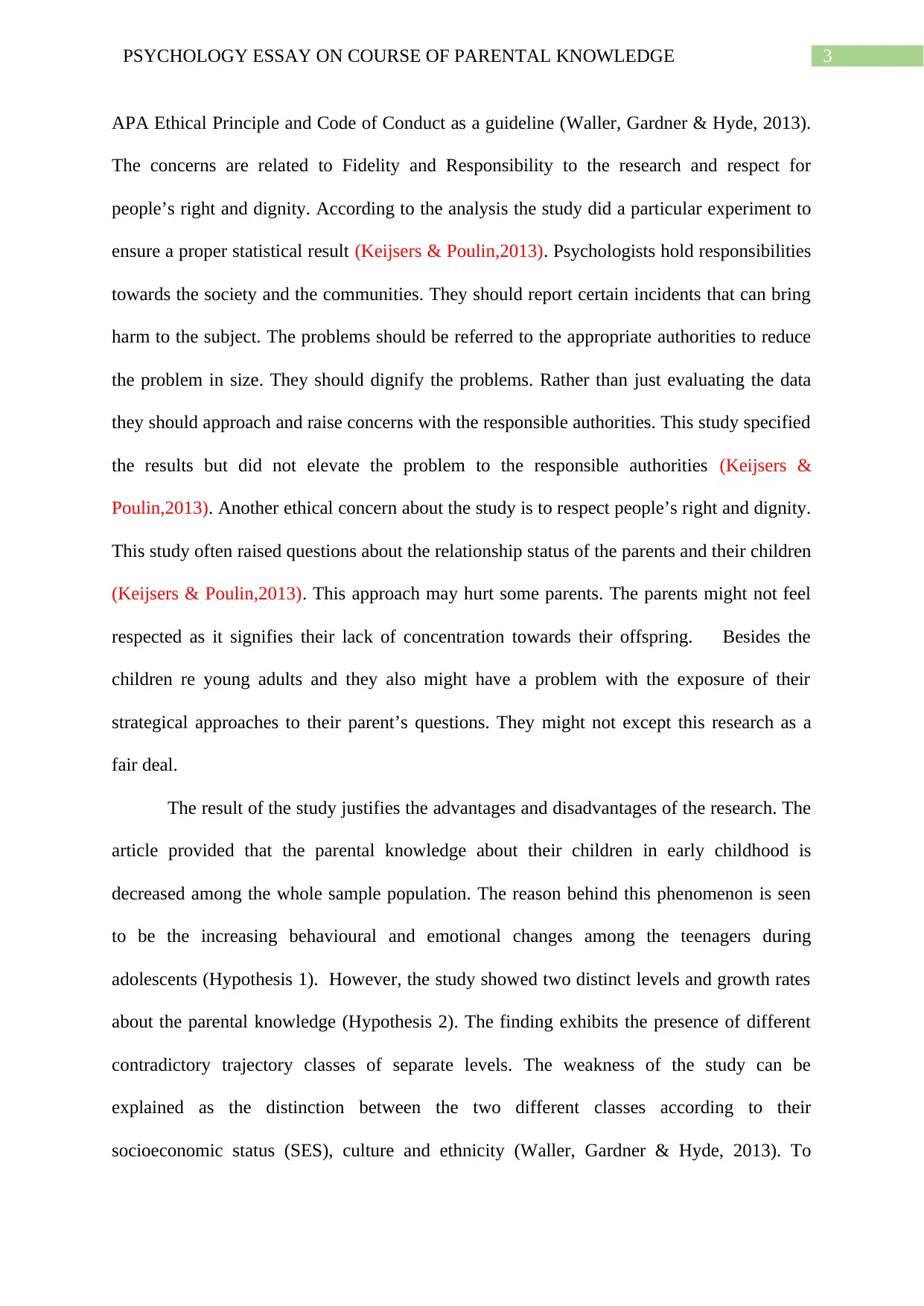
3PSYCHOLOGY ESSAY ON COURSE OF PARENTAL KNOWLEDGE
APA Ethical Principle and Code of Conduct as a guideline (Waller, Gardner & Hyde, 2013).
The concerns are related to Fidelity and Responsibility to the research and respect for
people’s right and dignity. According to the analysis the study did a particular experiment to
ensure a proper statistical result (Keijsers & Poulin,2013). Psychologists hold responsibilities
towards the society and the communities. They should report certain incidents that can bring
harm to the subject. The problems should be referred to the appropriate authorities to reduce
the problem in size. They should dignify the problems. Rather than just evaluating the data
they should approach and raise concerns with the responsible authorities. This study specified
the results but did not elevate the problem to the responsible authorities (Keijsers &
Poulin,2013). Another ethical concern about the study is to respect people’s right and dignity.
This study often raised questions about the relationship status of the parents and their children
(Keijsers & Poulin,2013). This approach may hurt some parents. The parents might not feel
respected as it signifies their lack of concentration towards their offspring. Besides the
children re young adults and they also might have a problem with the exposure of their
strategical approaches to their parent’s questions. They might not except this research as a
fair deal.
The result of the study justifies the advantages and disadvantages of the research. The
article provided that the parental knowledge about their children in early childhood is
decreased among the whole sample population. The reason behind this phenomenon is seen
to be the increasing behavioural and emotional changes among the teenagers during
adolescents (Hypothesis 1). However, the study showed two distinct levels and growth rates
about the parental knowledge (Hypothesis 2). The finding exhibits the presence of different
contradictory trajectory classes of separate levels. The weakness of the study can be
explained as the distinction between the two different classes according to their
socioeconomic status (SES), culture and ethnicity (Waller, Gardner & Hyde, 2013). To
APA Ethical Principle and Code of Conduct as a guideline (Waller, Gardner & Hyde, 2013).
The concerns are related to Fidelity and Responsibility to the research and respect for
people’s right and dignity. According to the analysis the study did a particular experiment to
ensure a proper statistical result (Keijsers & Poulin,2013). Psychologists hold responsibilities
towards the society and the communities. They should report certain incidents that can bring
harm to the subject. The problems should be referred to the appropriate authorities to reduce
the problem in size. They should dignify the problems. Rather than just evaluating the data
they should approach and raise concerns with the responsible authorities. This study specified
the results but did not elevate the problem to the responsible authorities (Keijsers &
Poulin,2013). Another ethical concern about the study is to respect people’s right and dignity.
This study often raised questions about the relationship status of the parents and their children
(Keijsers & Poulin,2013). This approach may hurt some parents. The parents might not feel
respected as it signifies their lack of concentration towards their offspring. Besides the
children re young adults and they also might have a problem with the exposure of their
strategical approaches to their parent’s questions. They might not except this research as a
fair deal.
The result of the study justifies the advantages and disadvantages of the research. The
article provided that the parental knowledge about their children in early childhood is
decreased among the whole sample population. The reason behind this phenomenon is seen
to be the increasing behavioural and emotional changes among the teenagers during
adolescents (Hypothesis 1). However, the study showed two distinct levels and growth rates
about the parental knowledge (Hypothesis 2). The finding exhibits the presence of different
contradictory trajectory classes of separate levels. The weakness of the study can be
explained as the distinction between the two different classes according to their
socioeconomic status (SES), culture and ethnicity (Waller, Gardner & Hyde, 2013). To
Paraphrase This Document
Need a fresh take? Get an instant paraphrase of this document with our AI Paraphraser
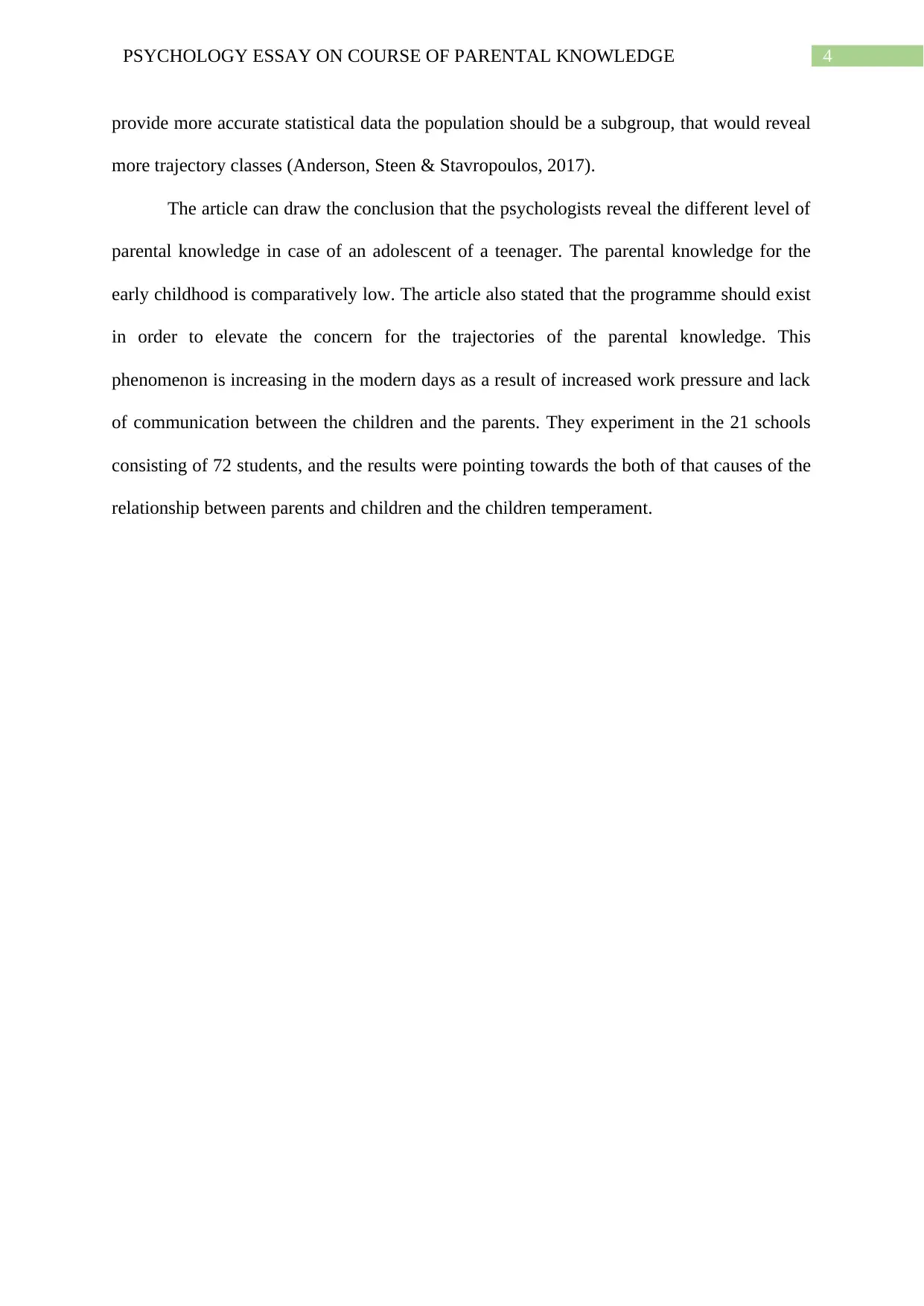
4PSYCHOLOGY ESSAY ON COURSE OF PARENTAL KNOWLEDGE
provide more accurate statistical data the population should be a subgroup, that would reveal
more trajectory classes (Anderson, Steen & Stavropoulos, 2017).
The article can draw the conclusion that the psychologists reveal the different level of
parental knowledge in case of an adolescent of a teenager. The parental knowledge for the
early childhood is comparatively low. The article also stated that the programme should exist
in order to elevate the concern for the trajectories of the parental knowledge. This
phenomenon is increasing in the modern days as a result of increased work pressure and lack
of communication between the children and the parents. They experiment in the 21 schools
consisting of 72 students, and the results were pointing towards the both of that causes of the
relationship between parents and children and the children temperament.
provide more accurate statistical data the population should be a subgroup, that would reveal
more trajectory classes (Anderson, Steen & Stavropoulos, 2017).
The article can draw the conclusion that the psychologists reveal the different level of
parental knowledge in case of an adolescent of a teenager. The parental knowledge for the
early childhood is comparatively low. The article also stated that the programme should exist
in order to elevate the concern for the trajectories of the parental knowledge. This
phenomenon is increasing in the modern days as a result of increased work pressure and lack
of communication between the children and the parents. They experiment in the 21 schools
consisting of 72 students, and the results were pointing towards the both of that causes of the
relationship between parents and children and the children temperament.
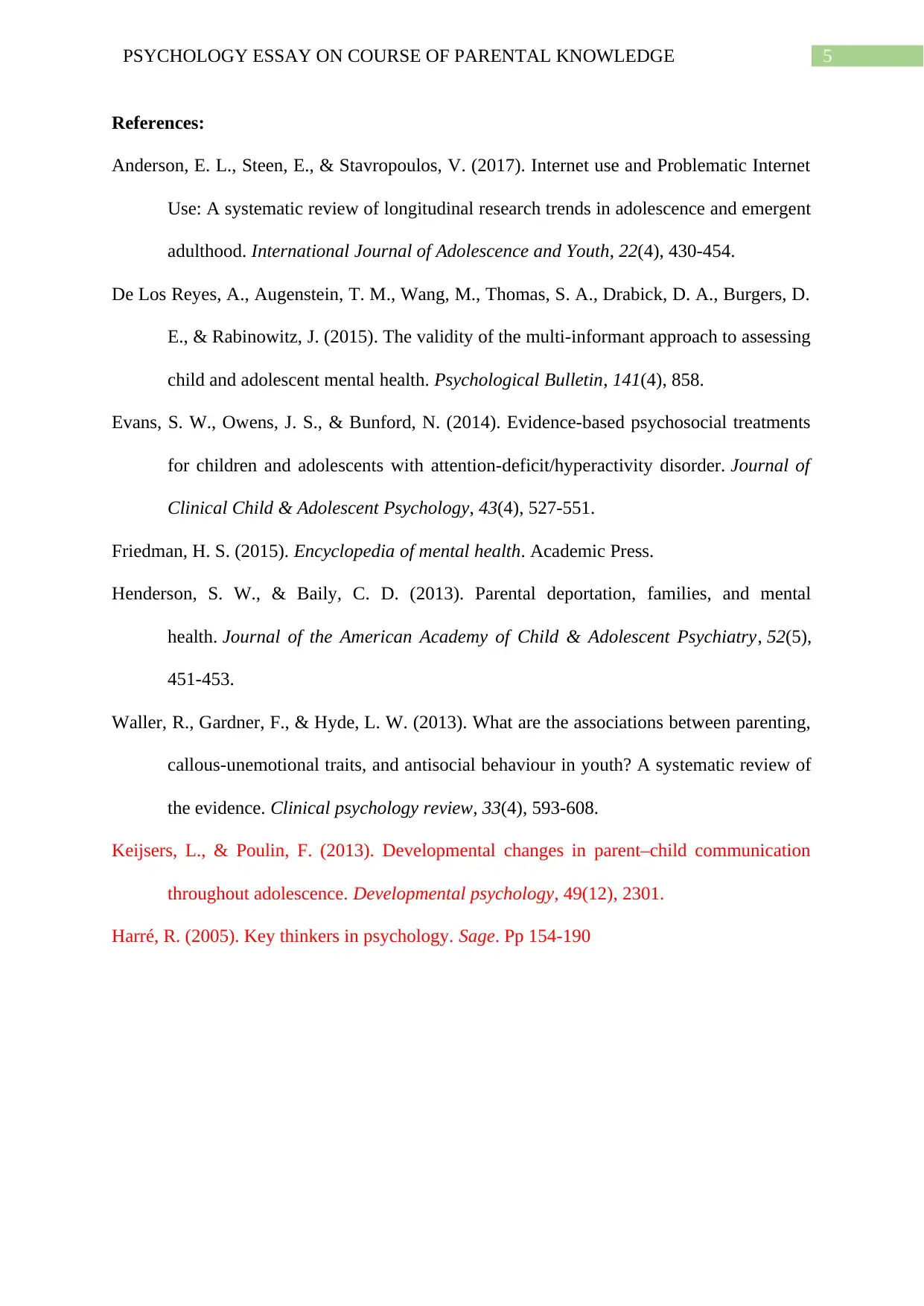
5PSYCHOLOGY ESSAY ON COURSE OF PARENTAL KNOWLEDGE
References:
Anderson, E. L., Steen, E., & Stavropoulos, V. (2017). Internet use and Problematic Internet
Use: A systematic review of longitudinal research trends in adolescence and emergent
adulthood. International Journal of Adolescence and Youth, 22(4), 430-454.
De Los Reyes, A., Augenstein, T. M., Wang, M., Thomas, S. A., Drabick, D. A., Burgers, D.
E., & Rabinowitz, J. (2015). The validity of the multi-informant approach to assessing
child and adolescent mental health. Psychological Bulletin, 141(4), 858.
Evans, S. W., Owens, J. S., & Bunford, N. (2014). Evidence-based psychosocial treatments
for children and adolescents with attention-deficit/hyperactivity disorder. Journal of
Clinical Child & Adolescent Psychology, 43(4), 527-551.
Friedman, H. S. (2015). Encyclopedia of mental health. Academic Press.
Henderson, S. W., & Baily, C. D. (2013). Parental deportation, families, and mental
health. Journal of the American Academy of Child & Adolescent Psychiatry, 52(5),
451-453.
Waller, R., Gardner, F., & Hyde, L. W. (2013). What are the associations between parenting,
callous-unemotional traits, and antisocial behaviour in youth? A systematic review of
the evidence. Clinical psychology review, 33(4), 593-608.
Keijsers, L., & Poulin, F. (2013). Developmental changes in parent–child communication
throughout adolescence. Developmental psychology, 49(12), 2301.
Harré, R. (2005). Key thinkers in psychology. Sage. Pp 154-190
References:
Anderson, E. L., Steen, E., & Stavropoulos, V. (2017). Internet use and Problematic Internet
Use: A systematic review of longitudinal research trends in adolescence and emergent
adulthood. International Journal of Adolescence and Youth, 22(4), 430-454.
De Los Reyes, A., Augenstein, T. M., Wang, M., Thomas, S. A., Drabick, D. A., Burgers, D.
E., & Rabinowitz, J. (2015). The validity of the multi-informant approach to assessing
child and adolescent mental health. Psychological Bulletin, 141(4), 858.
Evans, S. W., Owens, J. S., & Bunford, N. (2014). Evidence-based psychosocial treatments
for children and adolescents with attention-deficit/hyperactivity disorder. Journal of
Clinical Child & Adolescent Psychology, 43(4), 527-551.
Friedman, H. S. (2015). Encyclopedia of mental health. Academic Press.
Henderson, S. W., & Baily, C. D. (2013). Parental deportation, families, and mental
health. Journal of the American Academy of Child & Adolescent Psychiatry, 52(5),
451-453.
Waller, R., Gardner, F., & Hyde, L. W. (2013). What are the associations between parenting,
callous-unemotional traits, and antisocial behaviour in youth? A systematic review of
the evidence. Clinical psychology review, 33(4), 593-608.
Keijsers, L., & Poulin, F. (2013). Developmental changes in parent–child communication
throughout adolescence. Developmental psychology, 49(12), 2301.
Harré, R. (2005). Key thinkers in psychology. Sage. Pp 154-190
⊘ This is a preview!⊘
Do you want full access?
Subscribe today to unlock all pages.

Trusted by 1+ million students worldwide
1 out of 6
Related Documents
Your All-in-One AI-Powered Toolkit for Academic Success.
+13062052269
info@desklib.com
Available 24*7 on WhatsApp / Email
![[object Object]](/_next/static/media/star-bottom.7253800d.svg)
Unlock your academic potential
Copyright © 2020–2025 A2Z Services. All Rights Reserved. Developed and managed by ZUCOL.





